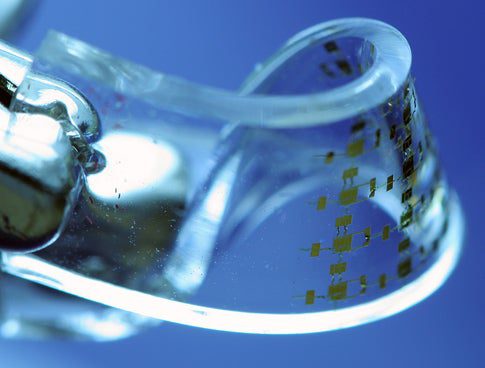That Nike + iPod technology that allows shoes and workout machines to feed information to portable electronics devices was a nice first step in merging athletic equipment and electronics to help users work out smarter. Now Reebok is taking the next step, working with startup MC10 to create flexible electronics that are built right into sportswear, removing the need for some clunky external device to record or transmit data.
Neither Reebok or MC10 is speaking specifically about what sort of products they are developing, but a Reebok exec has said the company wants to use flexible electronics technology to develop athletic apparel that is also a device, making the electronics invisible to the user. Using MC10 flexible silicon tech, Reebok could conceivably incorporate electronics into a shirt or a patch that sticks directly onto the skin.
Those wearable electronics would conform to the shape of the body, requiring no casing for hard electronics. They could be laden with sensors that monitor an athlete’s biological indicators, like pH levels in sweat, heart rate, or blood pressure, generating data on metabolism or other factors and beaming it wirelessly to a trainer’s laptop. Or they could be more simple, counting steps to measure the distance traveled or the number of reps completed.
MC10’s electronics (born out of a collaboration between materials scientists from U. of Illinois and Harvard) are ideal for such products, as they are pressed from super-thin strips of silicon that have been printed onto flexible substrates that can be incorporated into textiles or embedded in the fabric or some of an athletic shoe. And while MC10 isn’t the first company to create flexible electronics, their silicon-based flex tech is more efficient and fast than comparable materials made of organic semiconductors.
But don’t go adjusting your workout to take advantage of smarter sports apparel just yet – the ideas are still in the lab and MC10 reportedly doesn’t see them hitting the market for a year or two. But the athletic niche may just be the tip of the iceberg for companies like MC10 that can effectively embed unobtrusive electronics in everyday apparel. Similar ideas have been kicked around the medical community for a while, such as shirts that can constantly stream diagnostic information to our doctors so they can get a larger picture of our daily physiology. We’ve already seen an evening dress that’s also a cell phone; we may soon be wearing more portable electronics than we carry.









